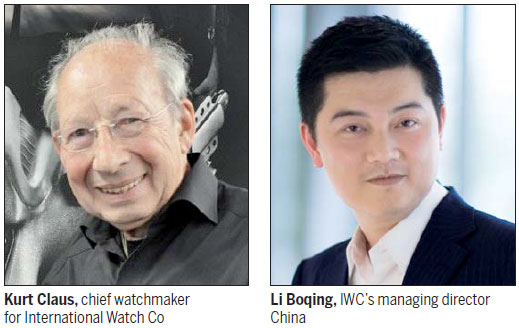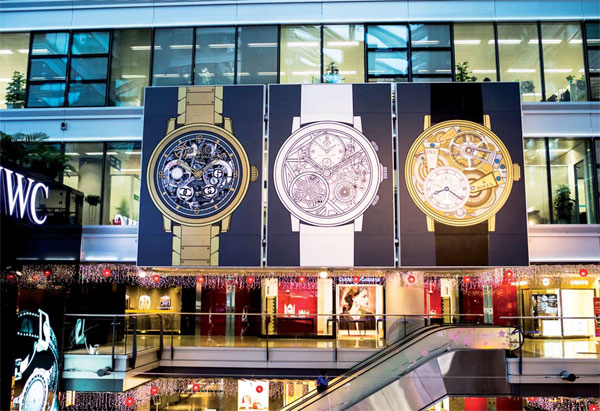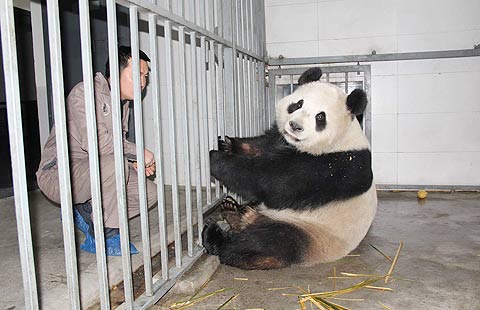Chinese market offers better times
Updated: 2014-02-21 08:32
By Liu Lu (China Daily Europe)
|
|||||||||||
|
International Watch Co's flagship store in Beijing. The Swiss watchmaker has 55 outlets in more than 30 cities in China. Photos provided to China Daily |
Swiss Watchmaker sees nation as its key growth area and is increasingly looking beyond major cities
For more than 50 years the ticking of watches has dictated the rhythm of Kurt Claus's life; many times over the past 10 years that incessant beat has taken him to China, where he has been on a mission to promote his company's fine wares.
Claus, chief watchmaker for International Watch Co, has just completed yet another a trip to the country, one that has taken him to some of its biggest cities.
One aim of the visits, apart from promoting his company's watches, is to learn more about the country's high-end watch market. His promotional tools include getting-to-know-you sessions in which invited VIPs are shown how the company's watches are made.
"About 10 years ago when I first came to China no one knew the IWC brand," says Claus, 78. "But in recent years that has changed significantly and the watch has become very popular, which is what brings me here every year. In fact, China has become one of our most important markets."
IWC, founded in 1868, is located in Schaffhausen, Switzerland. With a passion for innovation and technical inventiveness, it has built an international reputation and become one of the most sought-after watch brands among Chinese watch collectors and the country's rich.
In recent decades the rise in Chinese consumers' purchasing power and the country's huge consumption potential have attracted Swiss watchmakers who have been able to trade on their immense prestige to attract Chinese buyers.
"We regard China as one focus of our company's global strategic marketing, and it will be a key driver of our business growth in the future," says Li Boqing, IWC's managing director China.
Li says that over the past decade, more Chinese have begun to wear expensive watches, and they are willing to spend money on watches with sophisticated functions, which he believes has helped stimulate the sales of IWC watches and of other upmarket brands in the country.
"The Chinese market is still young for high-end watch brands, but the potential for growth is huge," he says, adding that China is undoubtedly the world's most dynamic and fastest-growing market for luxury brands generally.
David Sadigh, founder and CEO of the market research company Digital Luxury Group, says consumers in China show the strongest global interest in haute horlogerie, or upmarket timepieces, whose sales in the country rose 57.9 percent last year compared with the year before, accounting for more than 30 percent of sales in the segment.
"Despite lower reported sales in the mainland, Chinese consumers' interest for haute horlogerie continues to grow," Sadigh says. "This love story is not ready to end anytime soon and will continue to drive a substantial proportion of sales outside China."
Li echoes that view.
"Although many Swiss watchmakers have been feeling a cooling of consumer demand in China since the end of 2012 because of slowing economic growth and the government crackdown on illegitimate lavish gift giving and conspicuous consumption, IWC remains very confident about the Chinese market and has no intention of putting a brake on its expansion plans in the country."
Li declines to disclose IWC sales figures, but says that in China it has grown significantly since the company entered the market in 2003, encouraging it to step up its promotion efforts as it aims to become one of the top five watch retailers in the country.
"Although IWC came into China a little later than other Swiss watchmakers, its long history of watch making and its excellent craftsmanship helped it become successful very early on."
Continued sales growth is largely due to its extensive product line, ranging from mid-range watches costing between 30,000 yuan ($4,950; 3,600 euros) and 40,000 yuan to top-of-the-range timepieces with complex functions that sell for up to 4 million yuan, Li says.
"Such a product strategy has helped us win more market share in China by meeting a diverse range of consumer demand."
IWC has 55 outlets in more than 30 cities nationwide, and will continue to expand its presence across the country, he says.
At the end of 2012 it opened its flagship store in Beijing, which is its biggest store in Asia. In the same year, IWC's website was given a Chinese look, and a magazine the company publishes came out in Chinese.
Like most luxury brands, Li says, IWC will continue to tap the Chinese market by moving into smaller cities where there are considerable opportunities.
"Consumer demand for high-end wrist watches has continually risen in China's second and third-tier cities over the past few years, and there is potential for growth.
"In addition to consolidating our business in developed markets such as Beijing and Shanghai, we will enhance IWC's brand awareness in cities such as Chengdu, Chongqing, Hangzhou, Nanjing, Shenyang and Tianjin, where we have already done very well, and believe it will greatly fuel IWC's growth in China."
Chinese people appreciate heritage and prestige, but as consumers mature, they look for uniqueness, so watchmakers incorporate Chinese elements into their designs so that they can come up with something new and specific to Chinese.
"Watches with Chinese elements have a greater appeal to customers in China, and some of our products sold here are limited editions designed specifically for the Chinese market, and they are of great value to collectors."
Chinese consumers now have a much wider rage of brands to choose from, Li says, and rather than buying watches simply to flaunt their wealth, they are increasingly interested in the brand's cultural heritage, which they believe will better display their fine taste.
To promote brand visibility, IWC has established itself on social media, such as Facebook, Twitter and Sina Weibo as the most visible haute horlogerie brand. IWC's online presence contrasts with the reluctance of most of its competitors to join the Chinese social media wave. IWC now leads in the digital world with more than 225,000 Facebook fans and 6,000 followers on Sina Weibo, Digital Luxury Group says.
"After more than 10 years, more luxury brands have begun to realize that they cannot rely solely on traditional advertising to cultivate customer loyalty in China," Li says. "Interacting with potential customers is becoming more important."
Even as Swiss watches continue to sell well in China, local watch companies will improve their performance, he says, and both will find their place in the Chinese market by targeting the right consumer groups and through constant technical and design innovation.
liulu@chinadaily.com.cn

(China Daily European Weekly 02/21/2014 page21)
Today's Top News
Pandas arrive in Belgium
China urges US to correct mistakes on Tibet
9 punished for spreading flu rumor
Beijing upgrades haze alert
Ukrainian parliament dismisses president
China strongly opposes Obama-Dalai meeting
Tax refunds to lure overseas tourists
Prosecutors tackle food crimes
Hot Topics
Lunar probe , China growth forecasts, Emission rules get tougher, China seen through 'colored lens', International board,
Editor's Picks

|

|

|

|

|

|






